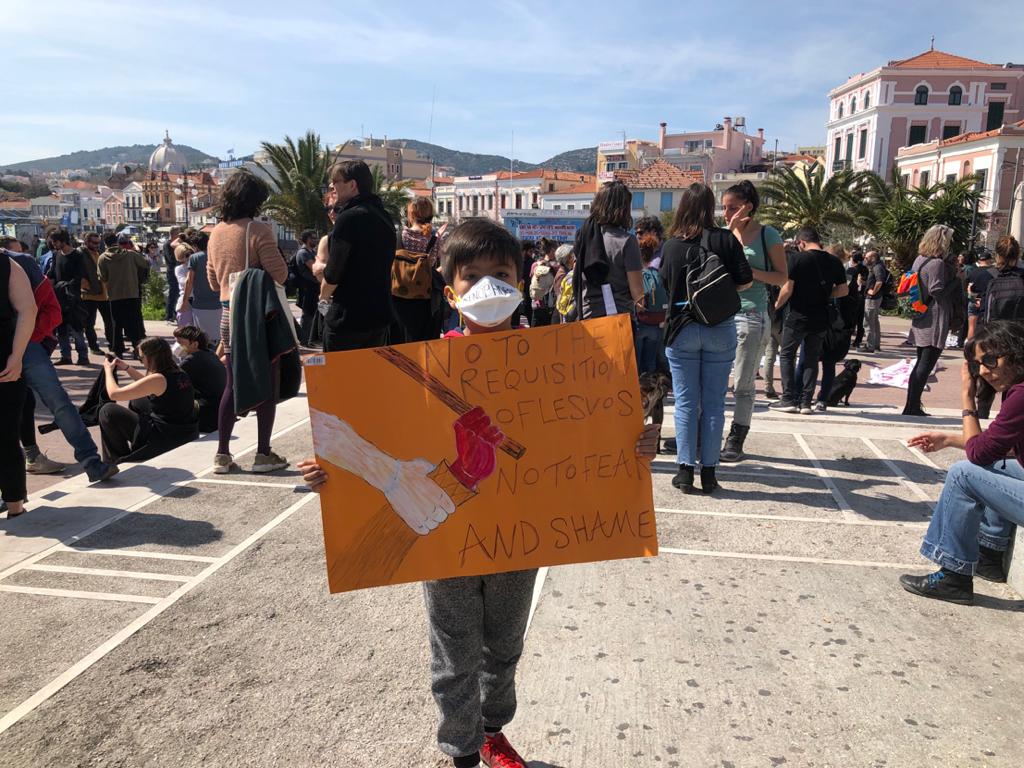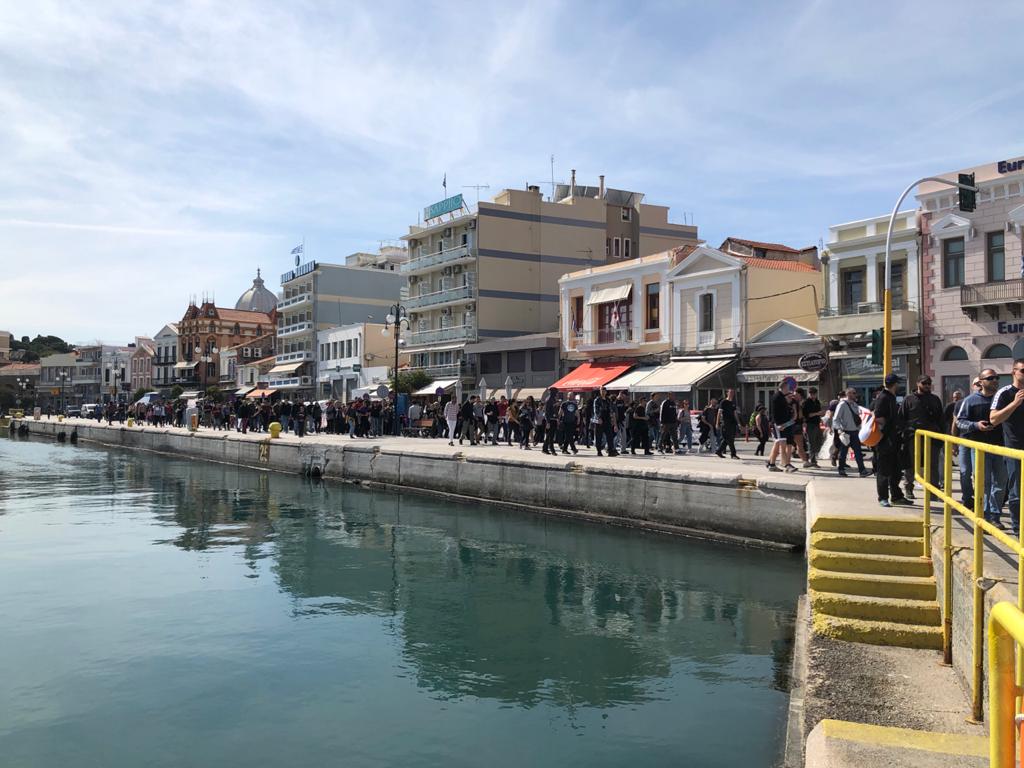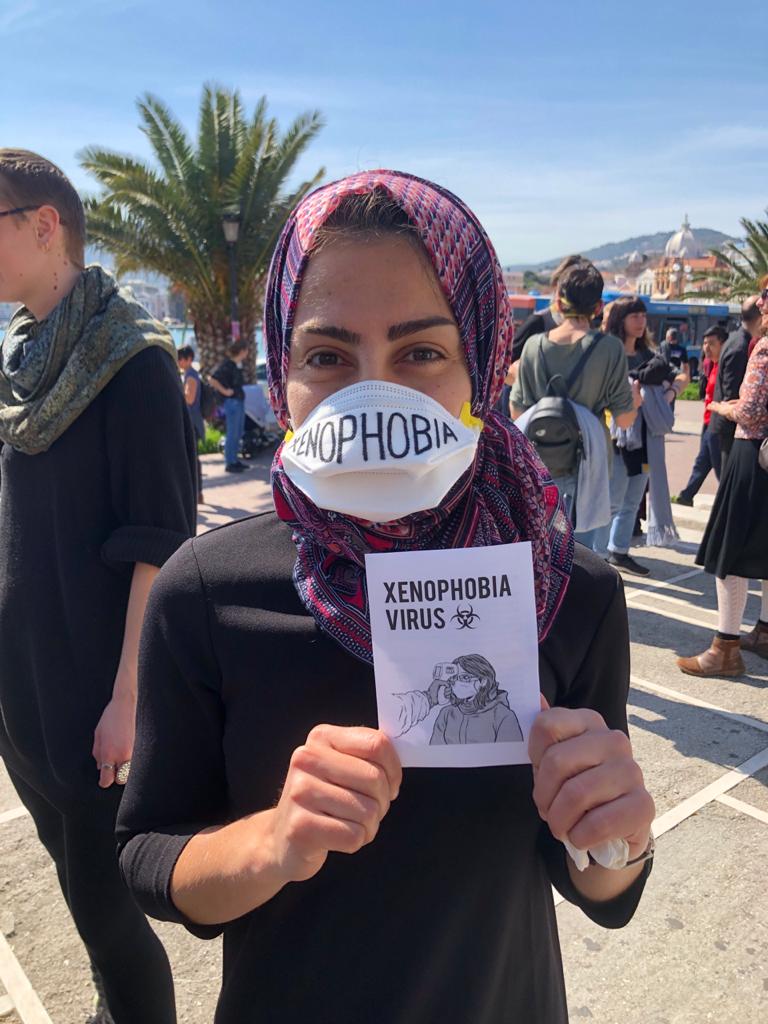Covid 19 in the camps in Greece
As a writer, my life in Gloucestershire under lockdown is as pleasant as it gets. My student son is with me and when we’re not at our desks we’re digging the garden, planting veg, admiring the white blossom on our plum tree and going for walks. Birdsong is louder than usual, the few cars which pass our cottage move more slowly than before and the air is clean and crisp. I feel good.

Good, that is, until I turn on the news. Listening to the day’s death toll, my mood changes. Hearing about the young health-care workers who are dying and imagining the grief of their children fills me with anger towards our incompetent government. Most of us know that ten years of austerity have brought the NHS to its knees, though many commentators are too obedient to the national ‘wartime’ spirit to press the point. And the shortages of PPE leave me speechless. Which way were Matt Hancock and Boris Johnson looking, when the rest of us were watching medics in hazmat suits in Wuhan, back in January? I don’t have any loved-ones working for the NHS, but the unnecessary suffering enrages me. How do you explain to a child that she’ll never see her mum or dad again, because the government didn’t think to buy in PPE?
If you’ve lost your job due to the crisis and are living in a small flat in a British city, lockdown must be a considerable trial. If you can’t survive on £94 a week and decide to continue working, in unsafe conditions on a construction site or in a factory, the sense that you’re living on borrowed time must be highly stressful. The media hums with stories of how worried and disrespected our lowest-paid workers feel.
What the media seems to largely overlook, on the other hand, is what it’s like for those who were already under impossible stress before the onset of the crisis: the asylum seekers in camps on Europe’s borders. I’m thinking of the Syrians, Iraqis, Afghans and Africans in Greece, because they’re the ones I know most about. This group of sixty to eighty thousand people must be among the most vulnerable in Europe to the ravages of Covid 19, due to appalling living conditions, immune systems debilitated by malnutrition and stress and the impossibility of following health advice.

In late February, President Erdogan of Turkey announced that his coastguard and border guards would no longer impede the movement of asylum seekers from western Turkey into Europe, abrogating an agreement which had held since 2016. [1] Infuriated, Greece swiftly surrounded the eastern Aegean islands with naval and coastguard boats. Lesbos, the largest of these islands, already had a refugee population of 27,000, whom its once-sympathetic Greek population had long since tired of hosting. When, in fine weather in early March, increased numbers arrived by boat, just as the first cases of corona virus were coming to light in mainland Greece, some of the locals reacted with violence. Their anger was exploited by ‘Nazi’ activists who travelled to the island from Germany and Austria, and by members of the Greek fascist party Golden Dawn who came from Athens. Asylum seekers, doctors, journalists and volunteers were attacked, and many refugee-supporting NGOs were forced to close their operations. Medecins sans Frontieres (MSF) was forced to suspend its clinic outside Moria camp for two days. A school for refugee children run by volunteers was burned to the ground; the crew of a human rights observation ship, Mare Liberum, was attacked by a mob in Mytilene harbour.
The new centre-right Greek government was impressively swift in its response to the corona virus, closing down businesses and imposing a strict lockdown on the country in the early days of March. For refugees in Lesbos, although the lockdown put an end to the attacks, it was some time before they grasped the new, equally serious threat they were facing. Perhaps this was partly due to the ‘gallows humour’ which helps refugees to survive: many simply could not believe that, after all they had suffered in their war-torn countries, and were now suffering in the ‘safety’ of Europe, a mere virus was something to concern them. Some thought talk of the virus was a joke, or even a conspiracy dreamt up by Europeans living in luxury and freedom. A Syrian friend of mine who wore gloves to go shopping was laughed at. But news moves fast on social media and Lesbos refugees now live in fear of falling sick, particularly those confined to Moria.

Moria camp is a former military facility with capacity for 3,000 residents; but at present it houses 20,000 in conditions of appalling squalor. A family of five or six people has to live in a space of 3 metres square; social distancing is not an option. Approximately 1300 people share each water station, 160 share each toilet and soap is not available. Food is provided by the camp, but refugees are obliged to queue for several hours for each, inadequate, meal. Forty percent of the residents are under eighteen, some unaccompanied; more than half live in rough tents and shelters in the ‘olive grove’, a squalid area outside the camp’s walls, awash with mud and rubbish. Since the lockdown began, only one person from each family resident in the camp is permitted to go out briefly, in order to shop; the policy appears to be based on a fear that refugees are more likely to spread the virus than are members of the Greek population.
Although there are no known cases of corona virus in Moria at present, the words of a German MSF doctor who has worked there recently leave one in no doubt as to why Moria residents would be so very vulnerable to the virus:
‘There are very sick children there who are suffering from chronic diseases such as epilepsy or diabetes…
‘…we’re dealing with a crisis, especially a mental health crisis, that we’ve rarely seen before anywhere in the world. Children are committing self-harm, young children are talking about suicide. They stop eating, stop speaking. We can treat them for the moment at the hospital, but then they always have to go back to where they came from, and that makes them sick. That problem was there before the corona threat…’
MSF and other NGOs are calling on the Greek government to evacuate Moria and other camps, but to date this has not happened. Meanwhile, although Greece has notably less cases of Covid 19 than many wealthier European countries including the UK, the numbers are steadily increasing. On 6 April, Greece had 1,735 confirmed cases, with 76 deaths. Only five cases have been reported thus far in Lesbos, with a single death; but on the mainland, the picture is more bleak, with outbreaks in two refugee camps. In Ritsona, to the NE of Athens, 20 residents tested positive on 2 April and the camp has been quarantined. In Malakasa, also NE of Athens, there is a single case.
Every couple of days, I talk by WhatsApp with my friend who wears gloves to go shopping. She already has her refugee status in Greece and lives in a clean house in Mytilene; for her, the main worry is less her own health but more that of her parents, living as IDPs in Idlib, Syria. There, a population of two million live in ruined towns and villages without access to proper medical care, caught between the forces of Assad pressing on them from the south and east and Turkey from the north. At present a ceasefire allows the spring birdsong to be heard and the virus remains at bay. She holds her breath.
[1] Erdogan’s move was rooted in the complex politics of the war in Syria, and the failure of the EU and NATO to provide the support he was seeking in his battle against Assad. A ceasefire was agreed between Putin and Erdogan and came into force on 5 March 2020.
0 Comments